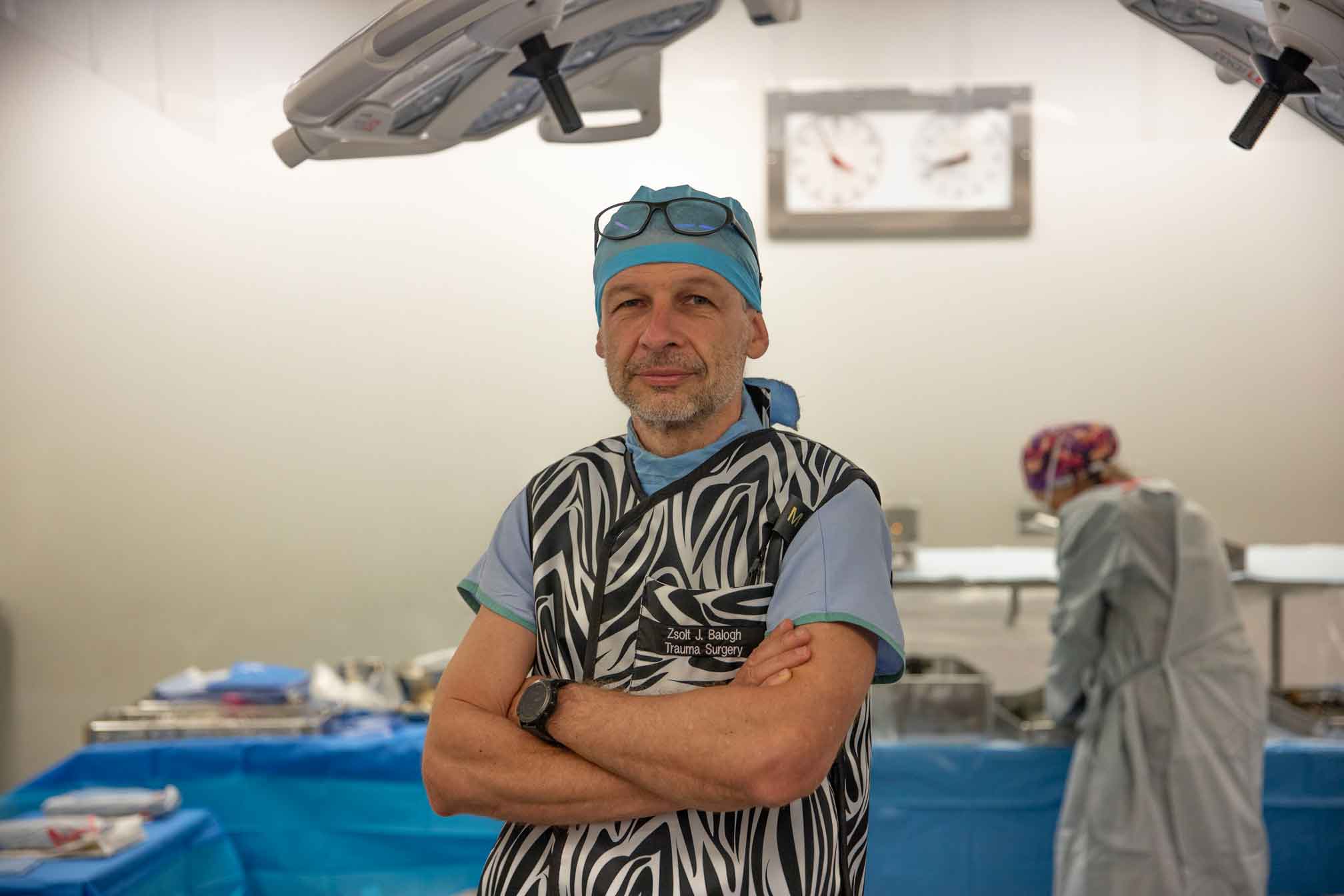Researcher Highlights
Save life with its quality
Professor Zsolt Balogh
Internationally recognised academic and active practicing trauma and orthopaedic surgeon, with special clinical and research interest in polytrauma, traumatic shock resuscitation, multiple organ failure, pelvic and acetabulum fractures.

Professor Zsolt Balogh combines his academic leadership and experience to help save lives with the aim to maintain quality.
The HMRI Award for Research Excellence 2023 recipients says, ‘My special focus is to understand the cellular and molecular mechanisms of how kinetic energy causes systemic inflammation and auto-destruction in living organisms and apply specific preventive and counteracting interventions.’
‘My institution manages over 500 severely injured (Injury Severity Score >15) trauma patients annually with the lowest risk adjusted mortality rate in Australia and New Zealand.’
‘Pelvic fracture related severe bleeding is a leading cause of potentially preventable deaths from injury with contemporary mortality of 30% in the United States of America. The systematic research and clinical application of our results with combined efforts of our multidisciplinary teams achieved a recently evaluated 10-year period at John Hunter Hospital when there were no bleeding related deaths from pelvic fractures. (PMID: 36648519).’
‘My research on optimisation of traumatic shock resuscitation (by limiting crystalloid infusions and provision of early coagulation factors) was implemented locally and we documented the improved outcomes compared to historic controls. (PMID: 12799335; PMID: 25390328).’
‘My leadership in organising an international panel on the definition of Polytrauma has resulted in consensus definition of this condition. More recently I have managed to advocate to accept polytrauma as a disease into the WHO ICD-11 edition. (PMID: 25494433).’
‘I am fascinated by the 2 billion years symbiotic relationship of our cells with mitochondria, which are governing our cellular energetics, cell division and cell death. We are developing a comprehensive program to restore injured cell, tissue and organ functions by restoring/reprogramming mitochondrial health.’
- Balogh Z, McKinley BA, Cocanour CS, Kozar RA, Valdivia A, Sailors RM and Moore FA (2003)
'Supranormal trauma resuscitation causes more cases of abdominal compartment syndrome',
Arch Surg, 138(6):637-642; discussion 642-633, doi:10.1001/archsurg.138.6.637. (PMID: 12799335)
https://pubmed.ncbi.nlm.nih.gov/12799335 - Pape HC, Lefering R, Butcher N, Peitzman A, Leenen L, Marzi I, Lichte P, Josten C, Bouillon B, Schmucker U, Stahel P, Giannoudis P and Balogh Z (2014)
'The definition of polytrauma revisited: An international consensus process and proposal of the new 'Berlin definition'',
J Trauma Acute Care Surg, 77(5):780-786, doi:10.1097/ta.0000000000000453. (PMID: 25494433)
https://pubmed.ncbi.nlm.nih.gov/25494433/ - Balogh ZJ, Lumsdaine W, Moore EE and Moore FA (2014)
'Postinjury abdominal compartment syndrome: from recognition to prevention',
The Lancet, 384(9952):1466-1475, doi.org/10.1016/s0140-6736(14)61689-5.(PMID: 25390328)
https://pubmed.ncbi.nlm.nih.gov/25390328/ - Devaney GL, Tarrant SM, Weaver N, King KL and Balogh ZJ (2023)
'Major Pelvic Ring Injuries: Fewer Transfusions Without Deaths from Bleeding During the Last Decade',
World J Surg, 47(5):1136-1143, doi:10.1007/s00268-023-06897-7. (PMID36648519)
https://pubmed.ncbi.nlm.nih.gov/36648519/
The University of Newcastle acknowledges the traditional custodians of the lands within our footprint areas: Awabakal, Darkinjung, Biripai, Worimi, Wonnarua, and Eora Nations. We also pay respect to the wisdom of our Elders past and present.
